It was November 2022 when OpenAI’s ChatGPT was launched. Everyone was curious and talking about this new AI-powered text-generating tool. This was the first time in history that the release of a digital technology sparked conversation worldwide at such a grand scale.
ChatGPT’s capabilities led to an artificial intelligence (AI) funding boom for startups and a race amongst the big names like Google, Meta, and Microsoft to reach the top spot. We know that all three companies soon released Gemini, Meta AI, and Copilot respectively to stay ahead in the game.
However, the release of China’s DeepSeek AI has garnered more attention than these AI-powered chatbots developed by these corporate giants for one major reason: it was created at a fraction of the cost compared to these AI tools, including ChatGPT—which was the most used AI chatbot until now.
In just a few weeks, DeepSeek has overtaken ChatGPT as the most downloaded free iOS app in the US. This has resulted in Nvidia losing $593 billion of its market value in one day, marking a new US stock market record.
From a Writer’s Perspective
Not long ago, I was fascinated with ChatGPT version 3.5 launched in 2023. The speed at which it could generate unique human-like content and solve problems felt like this was the beginning of an AI revolution. Being a writer who values authenticity and loves the art of writing and editing, my interest eventually took a back seat.
That said, I’ve been using ChatGPT to generate content ideas and article outlines and, lately, to conduct web searches—a feature added in September 2024. Now, with DeepSeek AI making waves on the internet, much like ChatGPT once did, it is the perfect time to explore a comparison. As a writer, I could compare both in terms of how well they perform in content creation.
This article provides an easy-to-understand comparison between the two most talked-about AI chatbots. Even if you are not tech savvy, It will give you an idea of how these AI-powered writing assistants are useful in business and personal settings.
What is ChatGPT?
For those who aren’t familiar with ChatGPT, it is an AI chatbot built by a US-based company OpenAI. Think of it as your virtual assistant capable of chatting with you, generating text, and providing information in a human-like conversational style.
Whether you want to write an email, send a personalized message to someone, brainstorm ideas, or create content for an article—ChatGPT can do it just the way you need. It is a favorite among students, professionals, writers, coders, and AI enthusiasts because of how effortlessly it handles queries.
ChatGPT has a user-friendly interface and anyone with an internet connection can use it as their go-to AI assistant. OpenAI continues to add new features to ChatGPT and has launched upgraded models like ChatGPT 01 and ChatGPT 01 Pro with advanced AI capabilities. These upgrades—including the latest model GPT-4o—have significantly improved its accuracy, speed, contextual understanding, and research.
What is DeepSeek AI?
DeepSeeK-R1, also known as DeepSeek is an AI model that works much like ChatGPT. It is developed by a Chinese company DeepSeek Artificial Intelligence Co., Ltd, which specializes in building open-source large language models (LLMs). An LLM is a machine learning model trained on enormous amounts of text (dataset) to understand, learn, predict, and generate human-like text.
Like ChatGPT, DeepSeek demonstrates the ability to integrate seamlessly with other platforms to boost productivity and efficiency. However, what really sets it apart is its cost. It has been developed at just approximately $6 million—a fraction of what it cost to build ChatGPT. Plus, it is free to use, unlike ChatGPT which offers paid plans for advanced usage. The affordability and accessibility of DeepSeek have led to its rapid rise in popularity.
Practical Applications: ChatGPT vs. DeepSeek AI Comparison
As a writer, I tested both ChatGPT and DeepSeek for different use cases. I have discussed the results below with the screenshots for better clarity:
1. Article Topic Generation
I used the prompt “Suggest unique and informative blog topic ideas to compare ChatGPT and DeepSeek.” Both AI tools generated the topic ideas at almost the same speed. ChatGPT generated 10 blog topic ideas whereas DeepSeek suggested 20. In addition, ChatGPT concluded its answer with “Would you like me to refine any of these based on your blog’s audience? 😊”
The results show that ChatGPT focuses on conciseness and relevance. Its capability to end responses with friendly follow-ups (including the use of a smiley) adds a touch of empathy, user focus, and personalization.
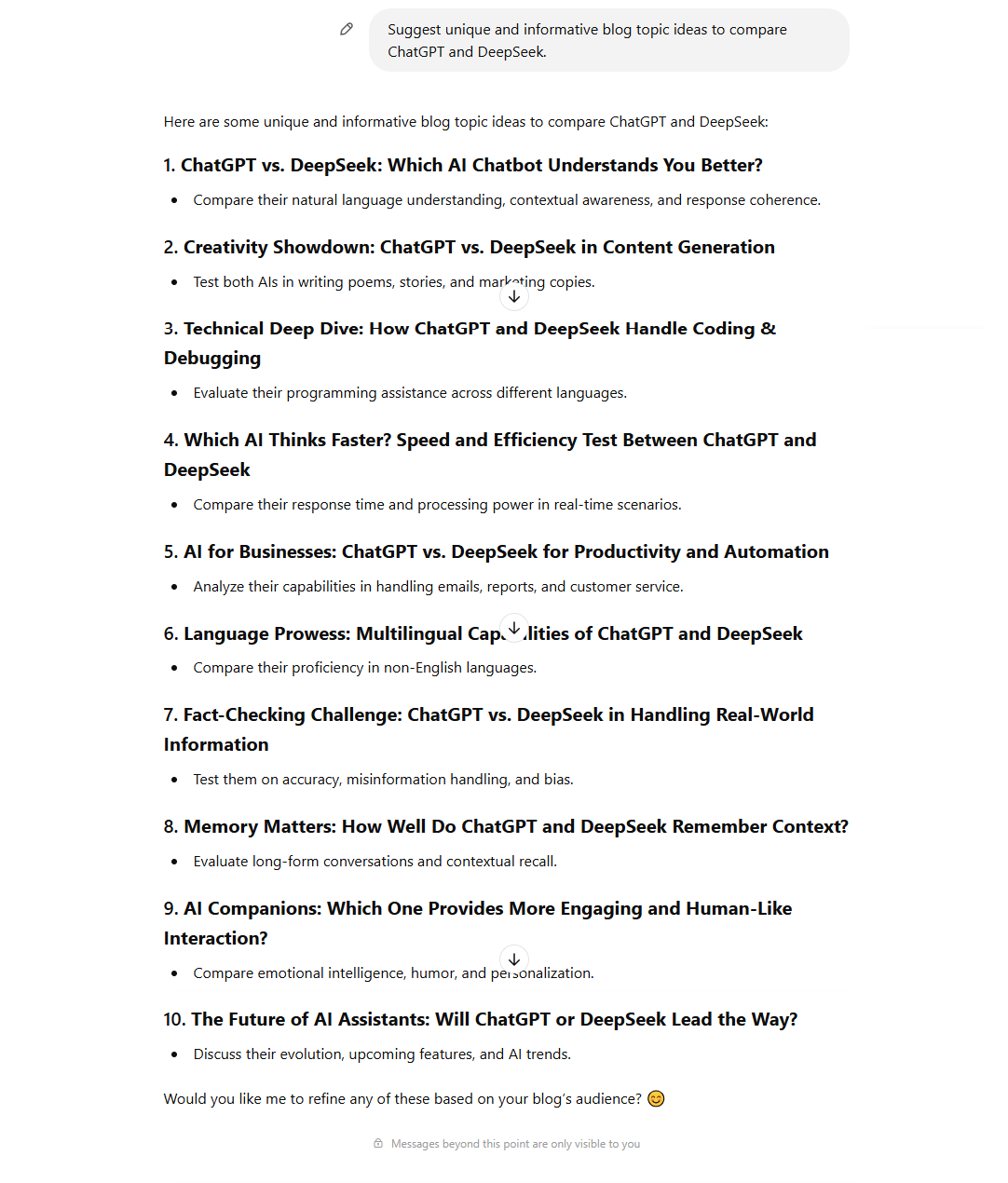
DeepSeek demonstrated its skills by providing a longer list of topics for broader coverage which can be helpful for brainstorming ideas. Instead of concluding with an open-ended question, it offered a summary of how the results could be useful. This shows its goal-oriented approach, focusing on immediate value rather than interaction.
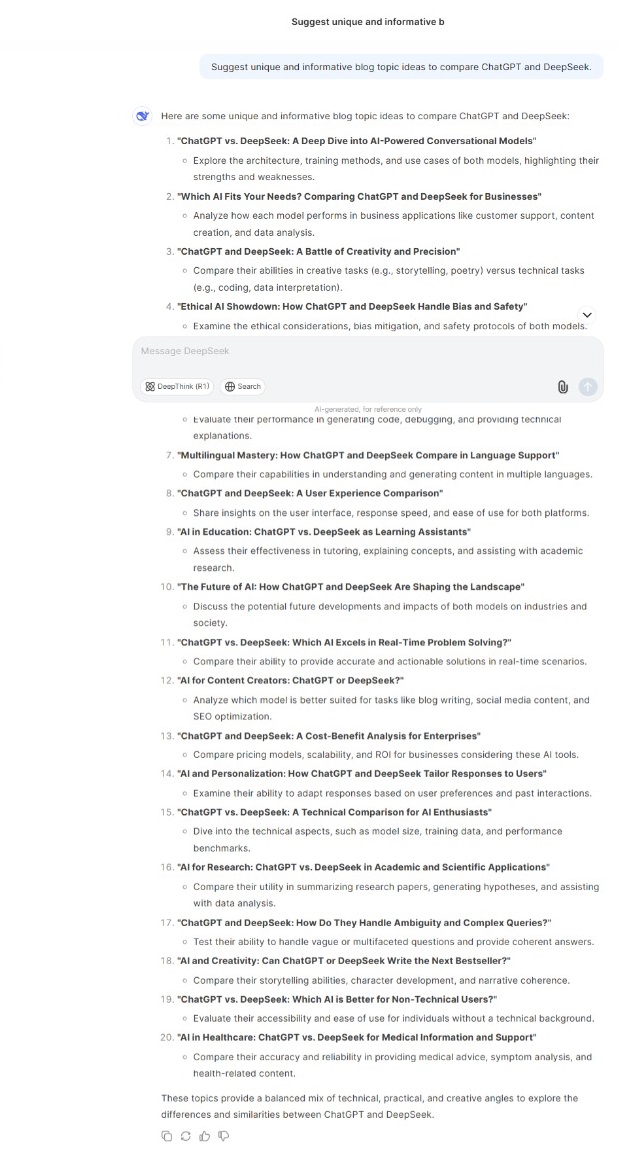
2. Article Outline Generation
ChatGPT took 24 seconds to generate the outline while DeepSeek took 41 seconds. When I used the same prompt again on a fresh page, both AI assistants provided different outlines each time.

As you can see in the images, DeepSeek provided a more organized, structured, and well-explained outline divided into clear “sections”. ChatGPT fell a bit short when it came to making the outline more readable and detail-oriented.
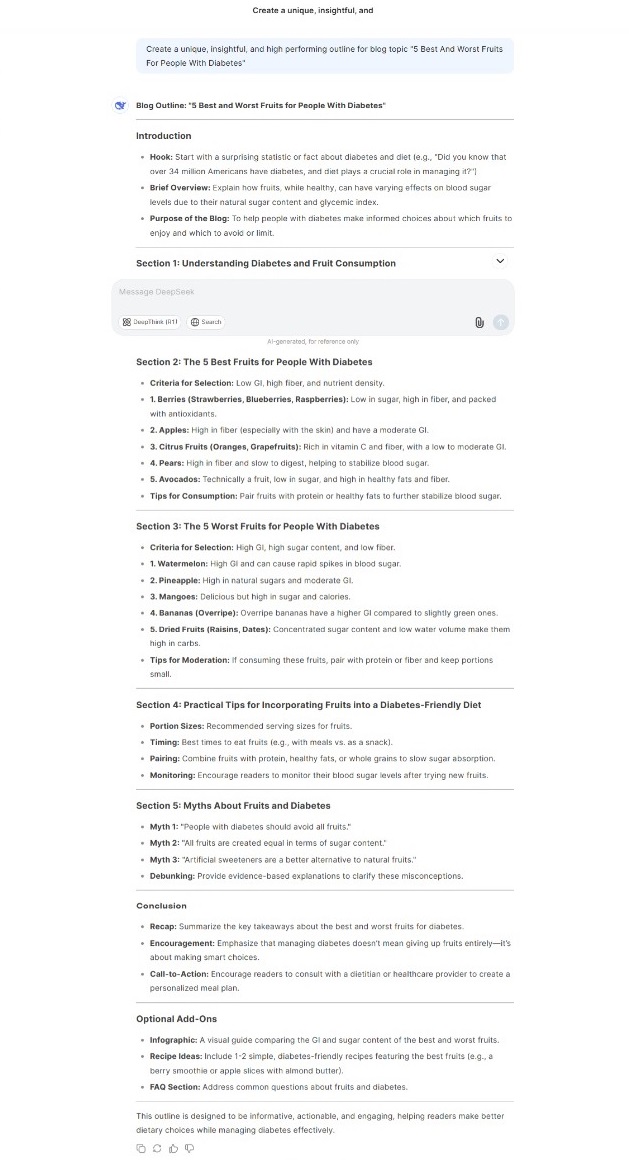
4. Keyword Integration
When it comes to integrating keywords naturally into an article, ChatGPT is the clear winner. I used the prompt “Use keywords “DeepSeek AI” and “ChatGPT capabilities” naturally and write a unique and informative 500-word article on “Introduction to ChatGPT and DeepSeek – AI Tools.” ChatGPT incorporated the keyword “DeepSeek AI” seven times—twice in the headlines and five times in the main content. The keyword placement felt natural throughout the article.
On the other hand, when I used the same prompt on DeepSeek, it placed the keyword “DeepSeek AI” five times—twice in the headlines and thrice in the main content. But, it could not use the second keyword “ChatGPT capabilities” anywhere in the content or headlines.
Research shows that ChatGPT performs better than DeepSeek in generating SEO-friendly content with naturally placed keywords. While DeepSeek excels at identifying key areas for keyword optimizations, it struggles to integrate keywords seamlessly into a content piece.
5. Email Communication
I used the prompt: “Write a professional email to a client informing them that their order has been successfully processed, providing an estimated delivery date, and offering assistance if they have any further questions. The tone should be polite and informative.”

When comparing the results, DeepSeek generated more detailed email content by including the order number (which ChatGPT missed ) and concluding with “Once your order has been dispatched we will send you a confirmation email with tracking information so you can monitor its progress.” This demonstrates DeepSeek’s attention to detail and its ability to deliver comprehensive, customer-focused communication.

6. Creative Writing (Story Idea Generation)
I used this prompt: “I want you to give me an idea to write a story about a girl and a tree. I want to write an inspiring story with emotion and motivation.” Both ChatGPT and DeepSeek came up with beautiful story ideas filled with emotion and inspiration.
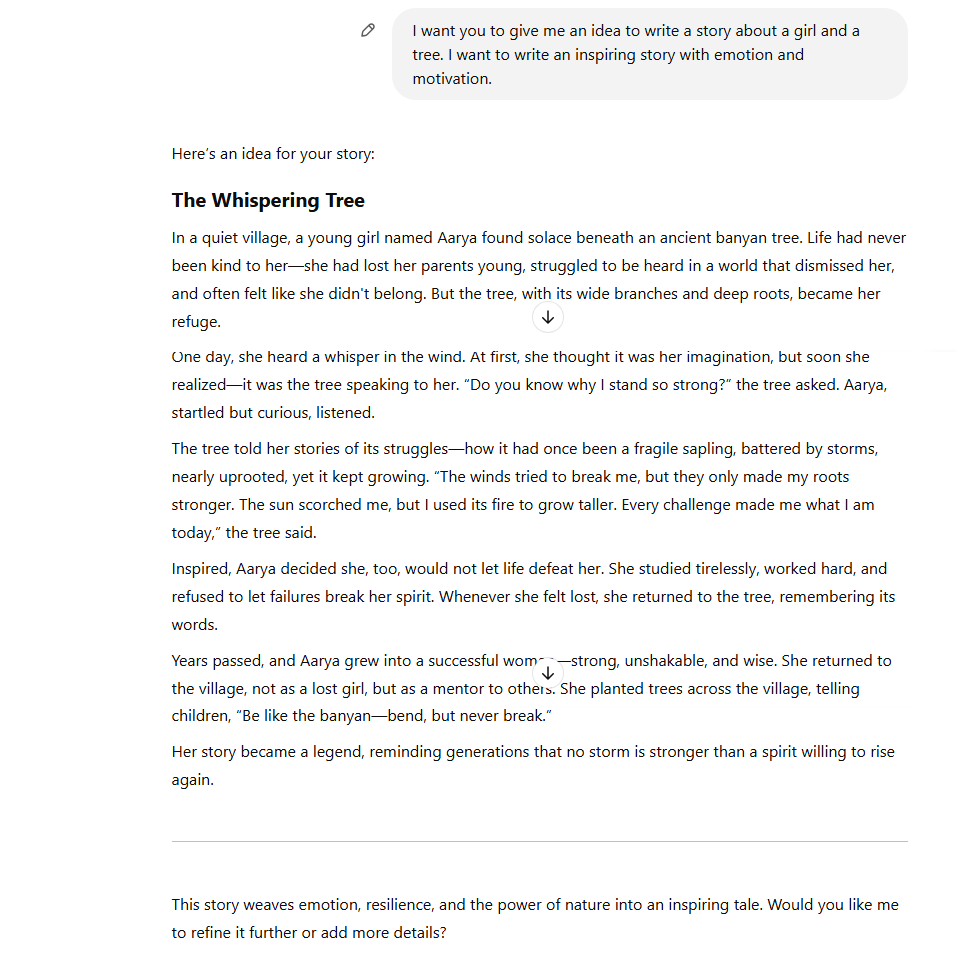
To my surprise, DeepSeek provided a more detailed and structured story plot, listing all the elements it used to generate the idea. For the first time, like ChatGPT, it concluded its response with an open-ended offer “Let me know if you’d like help expanding on any part of it.”

7. Research and Fact Checking Capabilities
As shown in the screenshots below, ChatGPT was able to provide the latest information for my prompt “Provide the latest global statistics on the usage of ChatGPT and DeepSeek.” It even included active links to credible sources—one of them was published on Jan 28, 2025—just 4 days before I asked for this information. According to research by Ahrefs, ChatGPT is the most used AI assistant guiding users to credible sources during their research, accounting for 50% of AI traffic to websites.
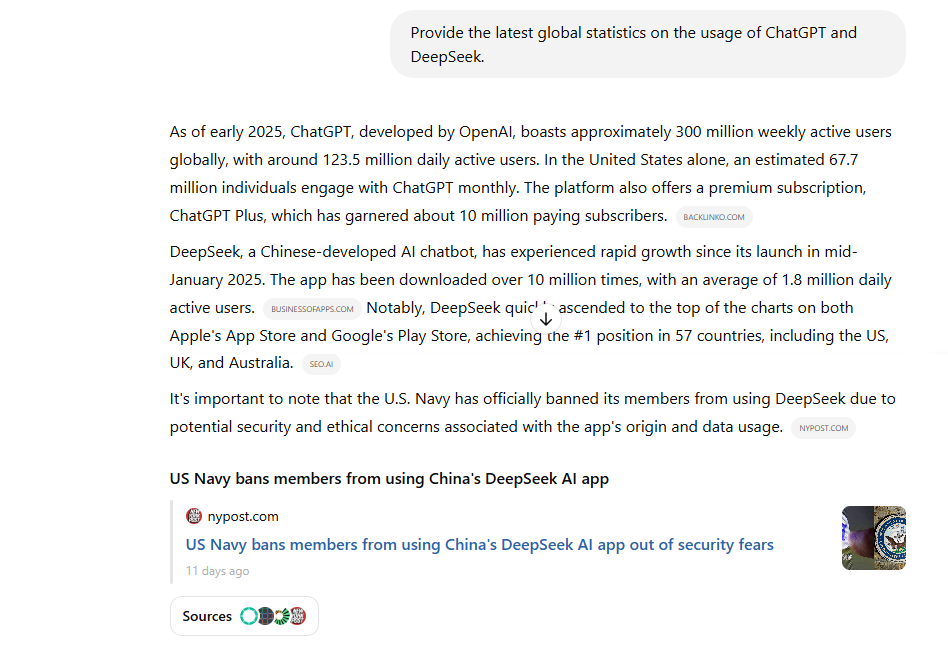
However, DeepSeek couldn’t provide any latest information for the same prompt. It clearly mentioned, “I do not have access to real-time or the latest global statistics.” In simple words, this means that the AI chatbot relies on a large library of books updated some time ago. Hence it is incapable of delivering the latest information.
DeepSeek is still actively being trained and updated with new models, including the recent release of DeepSeek-V3. This suggests it may soon reach the potential we see in ChatGPT’s features.
That said, if you are looking to perform in-depth research based on data available until July 2024, DeepSeek is still an excellent tool.
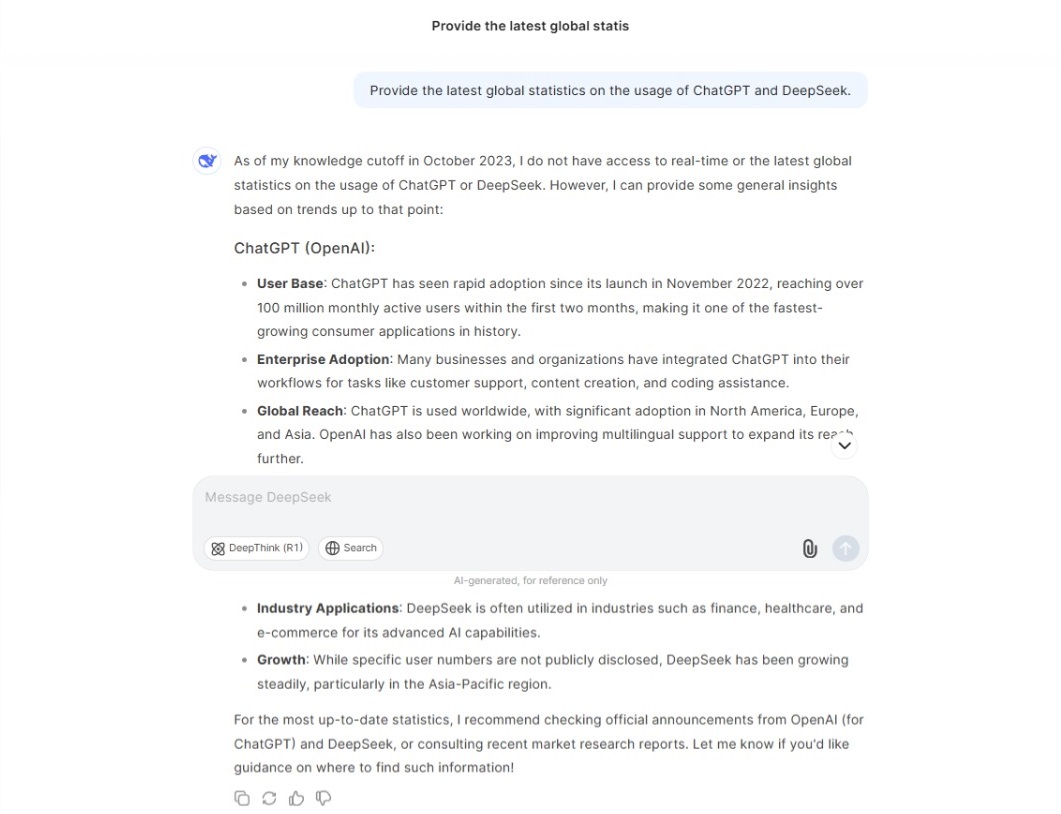
Key Features Comparison
|
Feature |
ChatGPT |
DeepSeek |
| Writing Quality | Produces natural, engaging, and conversational content | Better at technical and research-based writing but can sound robotic at times |
| Creativity | Great for storytelling, poetry, and creative writing | Great, but may struggle with emotional depth at times |
| Grammar & Clarity | Well-polished grammar with clear sentence flow. | Sometimes overuses complex words, making readability harder |
| Factual Accuracy | Generally reliable but may require fact-checking | Good at providing accurate and well-cited information |
| SEO & Blog Optimization | Understands SEO principles and can optimize for rankings | Lacks deep SEO awareness, but still generates structured content |
| Tech & Research Writing | Decent, but may miss highly technical nuances | Excels in technical and data-driven writing |
| Customization & Tone Control | Can adapt tone based on user preferences | Limited tone variations, often sounding rigid |
| Speed & Responsiveness | Quick responses with minimal lag | Comparatively slow for complex prompts |
| Use Case Best For | Bloggers, marketers, creative writers, and general users | Researchers, academic writers, and technical experts |
| Privacy and Data Security | Strong privacy policies; user data is encrypted. | Focuses on data security but is less transparent |
| Device Compatibility | Available on web, mobile, and desktop apps | Available on web, mobile, and desktop apps |
Which Tool is Right for You?
After using DeepSeek several times, I can say it focuses on delivering more structured responses. This is particularly helpful for users seeking accuracy and depth in specific niches.
Both ChatGPT and DeepSeek’s latest model, DeepSeek-V3 have their own set of strengths and weaknesses just like we do as humans. From that perspective, it is worth trying both AI assistants in different scenarios as explained in this post—to get the best out of them.
You might be surprised by how each model shines in different tasks—whether it’s generating creative content, conducting deep research, or simply asking a question.
Fun Fact
About ChatGPT: It took ChatGPT just 5 days to reach 1 million users after its launch! To compare, it took Facebook 10 months and Netflix 3.5 years to hit that milestone. AI is clearly stealing the show faster than we can type!
DeepSeek’s Origins: Did you know DeepSeek was initially designed for academic research? It’s like ChatGPT’s nerdy cousin who always aces the tests! That is why it excels in providing structured and more organized answers!
Stay curious, and keep learning with TechBuzz24!



